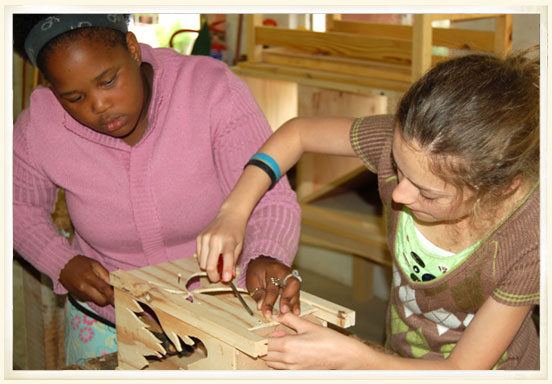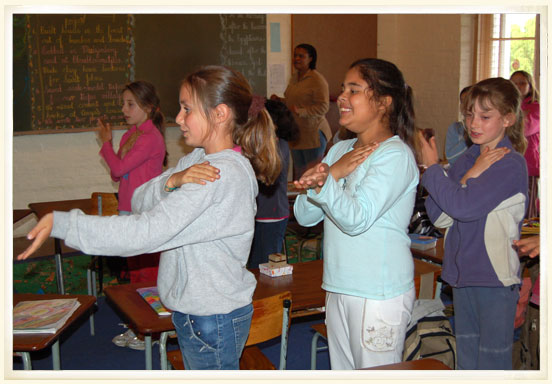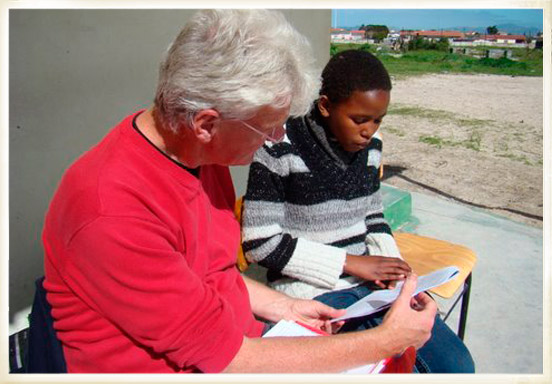
The Developing Human Being
The basis of the Waldorf curriculum is the developing human being and the aim is to prepare children for life. We believe that Waldorf Education has the power to awaken in growing human beings those forces and abilities that they will need for the rest of their lives in order to work competently for their community of contemporaries and to have a livelihood that will sustain them.
Many different competencies are needed for the individual to develop and thrive in the conditions current in the world today and in the South Africa of tomorrow.
Learners today live in a knowledge-based world and a knowledge economy, in which technology has transformed many aspects of life and work. Young people can look forward to working lives demanding flexibility, frequent shifts between employers and roles and a high degree of adaptability. They will also be expected, and may indeed prefer, to take responsibility for their own destinies in regard to education and training and financial security. It will fall to them to define their own career patterns. This new and often insecure world will offer enormous opportunities as well as make enormous demands on individuals and it is vital that they are properly prepared for this.
Within the context of Waldorf education, competence is regarded as the ability to understand and do. This aptly sums up the essence of Waldorf educational aims, not only to be able to understand but to be able to do as well. One might add, to understand and do out of insight in freedom.
One of the key competencies that we aim to teach is the ability to learn from life. Rudolf Steiner, the founder of this form of education states, *
The important thing is learning to learn, so that, however old one is, one can remain, up to the very year of one’s death, a student of life….It is important that we discover an educational method where people can learn how to learn, to go on learning from life their whole life long.
* Ref lecture 18 May 1919: A Social Basis for Education
At the same time children come to school today with many more weaknesses and learning disabilities. Their concentration and ability to take in information is weaker. The capacity to be part of a group is weakened because they are less aware of others around them and are used to more instant gratification of their wishes. Their motor co-ordination is less developed because life presents them with too few opportunities to develop it at the right age. Children’s hearing is less focused and often damaged due to exposure to loud music through earphones and because it has been de-sensitized by background incidental music. They have learned to filter out and that hinders their ability to distinguish the essential from the inessential.
As educators, we have to look at the situation of children as objectively as we can and create environments, both physical and cultural, in which they can develop the base skills and competencies they need at the right time. Sometimes this means deferring some experiences, in other cases it means getting on with things we used to leave until later.
Instead of keeping education mainly theoretical and remote from real life (the main trend for the last hundred years) Waldorf education teaches learners to learn from life, learn through doing and making – ways of learning that the latest research shows is far more effective.

Shoe making in the junior primary

Lantern making in preparation for a festival in the senior primary

Working with recitation and gesture
Curriculum Includes Method
The method of teaching is based on an in-depth study of child development and will vary with the age of the child. The way the lessons are presented are equally as important as the content, thus the term Waldorf curriculum implies a description of the whole teaching approach, method and content.
It is a methodology that encourages self-discovery, research and engagement with the subject matter so that a proper body of knowledge can be built. The curriculum places emphasis on practical work, which includes, as intrinsic to each year, such activities as handwork, woodwork, gardening, metalwork, craft and design. In addition Waldorf’s emphasis on entrepreneurial insight and effort is able to develop these skills to be of use in the meaningful participation in society.
Education Towards Health
Waldorf education seeks to support the health of the learners so that they can optimally realise their highest potential as human beings. Health is meant in an holistic sense and not only in the sense of bodily well being. Questions of nutrition and a healthy home environment are frequent subjects of discussion at the parent evenings. There is a strong focus on providing specialised therapies, such as Curative Eurythmy that support children with barriers to learning.

Council coordinator assessing reading
Evaluation
Evaluation is part of a culture of educational quality development. The aim is that every aspect of the curriculum is regularly reviewed and evaluated. This is done both by the individual teacher and by the Faculty of Teachers. It is also done by the Federation Council, which conducts an annual survey of schools. The intention is to extend the scope of this from academic to other teaching and administrative standards.
Teacher Accountability
All Waldorf Teachers are accountable to their colleagues and to the College of Teachers. The College is a responsible administrative body that performs similar functions to a headmaster of a school. It is accountable to the public, the Federation of Waldorf Schools and the Department of Education.


Social Awareness is Intrinsic to the Curriculum
The Mixed Class
In Waldorf schools obtaining a broad social mix is a basic principle of the work. It is generally considered desirable that we should live in a tolerant and compassionate society. The attitudes we develop about childhood lay the foundation for this. If social awareness rather than class or ethnic division is to be achieved, then school classes need to consist of children of many abilities and social contexts so that the learners can discover that everyone has an equal value regardless of their circumstances, gender, ethnic or religious background. This is a firmly upheld policy of Waldorf schools although; certain schools have serious financial strain because they do not have government subsidies.
Inner Commitment of the Teacher
Additionally Waldorf teachers are expected to develop a willingness to work on their own meditative life. They do this in a way in which learners are considered as individuals, so that a clearer conception is built up of what they will need in the next lesson. Such non-judgmental thoughts about other people have the potential of facilitating relationships and overcoming difficulties. The consistent effort of the teacher is to carefully observe the nature of the growing child in all aspects, to see the child as he or she can become. This opens doors for unlimited potential.
Eurythmy
A fundamental component of the Waldorf curriculum is the inclusion Eurythmy as a subject. Exclusively taught in Waldorf schools, it is an art of movement that engages the whole human being, integrating bodily movement with movements that arise within the soul. These inner movements, that give rise to speech and music are transformed into outer movements. This has benefit for the individual child and also strongly develops a social consciousness, as the pupils work together in movement as a group.